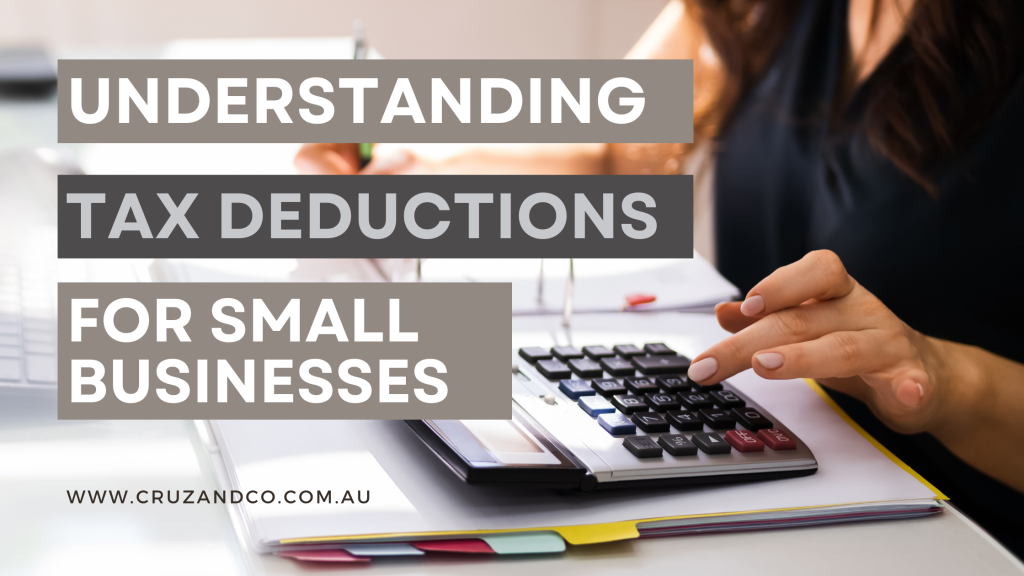
Tax deductions play a crucial role in reducing taxable income for small businesses. By identifying and claiming eligible deductions, business owners can significantly lower their tax liability and free up resources to invest back into their operations. In this article, we will explore the ins and outs of tax deductions for small businesses, providing valuable insights and practical tips to help you maximise your deductions effectively.
What Are Tax Deductions?
Tax deductions are expenses incurred by businesses that can be subtracted from their total taxable income. Tax is then calculated on the net amount (being taxable income). By identifying and utilising eligible deductions, small business owners can legally minimise their taxes and reinvest into the business.
Qualifying for Small Business Tax Deductions
To claim tax deductions as a small business, you must meet certain criteria. Typically, the classification of a small business as defined by the ATO is is your business is not linked with any other businesses and your business turnover is < $10m. Note that for capital gains tax purposes, a small business is defined differently.
Types of Tax Deductions for Small Businesses
- Start-up Costs: These may not initially be tax deductible, whilst other expenses need to be deducted over a number of years. Typical expenses include legal fees, business set up costs, market research, and initial advertising costs.
- Prepayments: needs to be less than 12 months prepaid
- Home Office Deduction: Discover the requirements and calculations involved in claiming deductions for your home office, including the simplified method and regular method.
- Business Equipment and Supplies: The Instant Asset Writeoff rules are constantly changing, so be aware of the limits each financial year. Purchases include equipment, office supplies, software, and other tangible assets.
- Employee Salaries and Benefits: If you are paying wages to employees, contractors or other staff, ensure you are complying with the ATO requirements, and Fair Work legislation. This is an area where you may require expert advice due to the complexity of the various legal and reporting systems.
- Business Travel and Entertainment: Learn about deducting travel expenses, meals, and entertainment costs associated with business activities. This may trigger unwanted Fringe Benefits Tax, or may not be tax deductible at all.
- Advertising and Marketing Expenses: Expenses related to advertising, marketing campaigns, and promotional activities may attract fringe benefits tax as well.
- Charitable Donations: Ensure that donations are paid to “Deductible Gift Recipients” in your donation is to be tax deductible. Funds paid to platforms such as GoFundMe may not be tax deductible.
- Superannuation Contributions: Understand how contributions to super can maximise your tax position overall. This can be a very power tax and wealth creation strategy.
Documentation and Record Keeping
Proper documentation and record-keeping are essential when claiming tax deductions. The ATO have information on what records are required to be kept and the minimum requirements for receipt details.
Maximising Tax Deductions for Small Businesses
To maximise your tax deductions, consider implementing the following strategies:
- Conduct thorough research: Stay updated on the latest tax laws and regulations to identify new deductions or changes that could impact your business.
- Seek professional advice: Consult with a tax professional who specialises in small business taxation to ensure you are utilising all available deductions.
- Industry-specific deductions: Explore deductions specific to your industry, as certain expenses may be eligible for deductions based on your business type.
Recent Tax Law Changes Affecting Small Business Deductions
Tax laws can change periodically, impacting small business deductions. Stay informed about recent updates to ensure you are aware of any changes that may affect your tax deductions.
Understanding tax deductions is essential for small business owners to optimise their tax planning and minimise their tax liability. By familiarising yourself with the various deductions available and staying informed about the latest tax laws, you can maximise your deductions effectively. Remember, it is always wise to consult with a qualified tax professional to ensure you are making the most of the available deductions for your small business.
